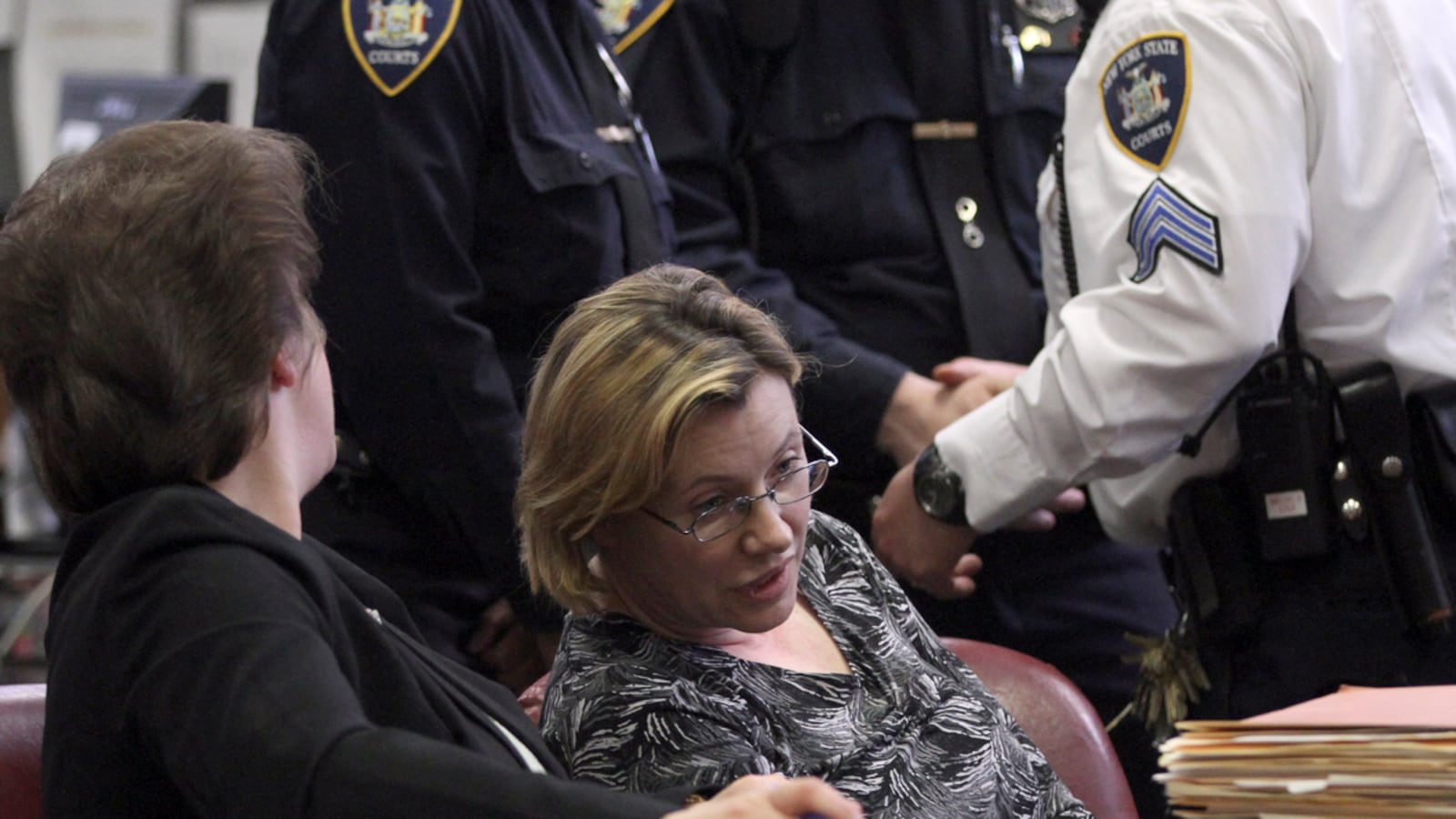Accused by prosecutors of running a Manhattan brothel, Anna Gristina says she’s not a madam but a matchmaker, whose inspiration for a new business venture came from watching Patti Stanger’s Bravo series, The Millionaire Matchmaker. Her dating defense raised more than a few eyebrows while she was held on Rikers Island, unable to post $2 million bail for nearly four months. Whether it was a stalling technique, a way to control spin, or a sincere account of her career goals, Gristina’s self-discipline paid off. A panel of five judges reduced her bail to a more civilized $250,000, and the New York Post reports that efforts are underway to get a bail package approved so she can prepare for her trial at home.
How will Gristina’s “dating strategy” play out when she returns to court to face trial? Perhaps we have a hint: in May, Gristina’s husband, Kelvin Gorr, appeared on Anderson Cooper’s daytime talk show. “She was not running a brothel, she was running a dating service,” Gorr said. “Basically, she has some very wealthy powerful friends, and she knows a lot of beautiful women.”
The TV host was skeptical, as was another guest, former madam Kristin Davis, but Gristina’s family and legal team have stayed on message regarding her dating-service defense and her innocence.
She has been charged with one count of promoting prostitution.
Jaynie Mae Baker, labeled an “accomplice” by tabloids and indicted for promoting prostitution in April, hasn’t been part of this public chorus, but reports in the Daily News and on ABC News about her connection to VIP Life, a self-described “elite social club” for “relationship-oriented men and women,” make it hard for me to dismiss Gristina’s explanation.
After the Anderson show, on which I also appeared, I asked Gorr whether I could interview him. While our exchanges were amicable, Gristina’s husband was reluctant to commit to an on-the-record conversation. Consequently, we have never discussed his wife’s situation—or his role in publicizing her dating-service defense.
In addition to the Anderson appearance, Gorr, who works in real estate, has denied the prostitution-related charges against his wife on Eyewitness News.
And on The Insider, he told Kevin Frazier there were benefits to be derived from his wife’s matchmaking: “Say, if we were looking for real-estate investors, somebody to invest in our projects, to introduce a gentleman to a very beautiful girl, it certainly works in your favor.”
Two days after Gristina’s bail reduction was announced, the so-called Mommy Madam did a jailhouse interview with the Today show, telling Matt Lauer how The Millionaire Matchmaker had provoked her imagination: “Instead of ‘single and seeking,’ it was ‘married and seeking’ ... very much like Match.com.”

This isn’t the first time the site has been mentioned. Shortly after her arrest, one of Gristina’s lawyers said his client was in the process of developing a dating site “that would have rivaled Match.com.” (Match.com, like the Newsweek Daily Beast Co., is owned by IAC.)
Whatever the outcome in court, Gristina’s dating defense just might be an idea whose time has come.
It is not entirely new, but the use of pop-culture references (such as Patti Stanger) and hugely successful corporations refines the idea quite a bit.
Escort-service owners have frequently argued that an escort is paid for her time, not for sex, or that sex that may occur is outside the contract. The argument hasn’t saved enough people from being convicted, but it continues to be made. It’s based on something so fundamental that we rarely examine it because it’s now so deeply embedded in our modern lives: a woman having sex with a man outside of marriage isn’t automatically a prostitute, an outcast, or a criminal—and that means her associates aren’t assumed to be criminals either. That’s the liberated subtext of the dating defense in all its variations. There’s something heroic—not merely expedient—about this argument, though it also has the potential to sound cynical.
Dating itself looks like a very businesslike activity in 2012, and Gristina chose two disparate and well-established brands, The Millionaire Matchmaker and Match.com, to make her point. During one memorable episode of The Millionaire Matchmaker, Stanger lectured her audience about monogamy, money, and “the best blow job possible.” Even if most viewers are unlikely to date a millionaire, the show’s sexual and financial frankness do reflect mainstream ideas about courtship. Tens of millions of Americans will, however, end up on a dating site where searching for romance is like shopping for a household appliance on Amazon. Dating has become more nakedly transactional and, with the rise of location-based apps, geared to consumer convenience. The idea that dating is just something we do when we’re getting to know each other seems naive when a multibillion-dollar dating industry exists.
OK, so Gristina’s dating defense might make sense as a piece of ideological warfare on behalf of the criminalized. How does her business plan stack up?
I asked Andrea Syrtash, a dating expert, TV host, and author of a guide to dating your spouse, Cheat On Your Husband (With Your Husband).
“Match.com is the largest dating site in the world,” said Syrtash. “They have many dating sites under their umbrella, including OkCupid, so it’s a lofty goal to aim to be bigger than the biggest. Anyone launching a startup dating site believes she will be the best and the biggest,” Syrtash was quick to add. “So I don’t blame her—that’s being a good entrepreneur.”
Syrtash sees how some of the social skills possessed by a madam are shared by matchmakers and dating-service entrepreneurs, but she isn’t convinced that Gristina understands the online-dating model and questions her strategy.
“Match.com is like a bargain basement with some great options if you look hard enough. It’s like shopping at Century 21,” Syrtash said. “The Match.com model is, we throw everyone from every background together and we give you tons of choices, and it’s for you to decide.”
This idea of creating a middle-market relationship mall is clearly at odds with everything else we’ve heard about the alleged Mommy Madam, whether from Gristina’s supporters or her tormenters. It’s not what Gristina’s husband described when he spoke on Anderson of wealthy men seeking discreet companionship. According to The New York Times, prosecutors have gone out of their way to emphasize the exclusivity of an alleged brothel servicing high-wealth individuals.
In many ways, Gristina’s experience as a social facilitator sounds too fancy for the Match.com model. We don’t know what connection, if any, exists between Anna Gristina, Jaynie Mae Baker, and VIP Life. It’s not a crime for people from different industries to befriend each other.
However, a visit to the VIP Life website helps me to appreciate the logic behind Gristina’s dating defense. VIP Life is clearly skewed toward commitment-minded singles, but there’s a surprising window of tolerance for the guy who says he’s not “ready for a relationship.” (Perfectly acceptable, says the FAQ, as long as the client is honest with the matchmaker, so she can match him up “with a woman with the same desire.”)
Traditional matchmakers, eager to distinguish themselves from a dating service, would frown on this feature. You won’t see casual dating on the menu at Selective Search (a Chicago-based personal-matchmaking firm with fees starting at $20,000) or at New York matchmaker Janis Spindel’s site. (Spindel quotes her initial fee as “$50,000 in the tri-state area.”)
What VIP Life, Selective Search, and Janis Spindel do have in common is a business model that treats well-to-do men as paying clients and exceptional-looking women as nonpaying members of a database. (It’s not the only business model, but, Syrtash told me, it’s popular throughout the U.S. and very common in New York.)
Selective Search tells prospective women: “Join now for free!” Spindel and VIP Life present things differently: many women apply and few are chosen, in case you were wondering.
Spindel’s goal is to get her clients married to the right person. She doesn’t protest when matchmaking is called “the second-oldest profession,” perhaps because her services aren’t open to misinterpretation. Spindel opened her gay division last year, in response to same-sex-marriage legislation—and not before. She is adamant about the difference between online dating and her own bespoke matches. Spindel also takes seriously state laws that regulate the New York dating industry.
A madam or anyone else hoping to cross over into matchmaking would be well advised to study Article XXVI, Section 394-C, of New York state’s general-business statute. During the jailhouse interview on Today, attorney Norman Pattis wouldn’t answer questions about his client’s matchmaking activities. Given the requirements of this law, that may be a wise move. A “social referral service” fee can be no higher than $1,000, while anyone paying more than $25 is entitled to a guaranteed number of introductions per month.
“You have to be extremely careful in terms of how your contract is written,” Spindel told me. “I, at least, abide by everything.” Explaining her $50,000 fee (which doubles when her client has been with his match for a year), she said, “I do a gazillion other things other than matchmaking. I have about 20 ancillary services from image consulting to a home visit to background checks.” The law treats these extras as separate from the social referral fee. “I’m from soup to nuts. I don’t just say, ‘Here’s a number, go meet her.’” Gold diggers, Spindel assured me, are easily detected and are eliminated from her database.
An audacious, compelling character who would have to be invented if she didn’t actually exist, Spindel says she hands out, on average, 200 business cards each day: “I’m out shopping, or scouting, for women morning, noon and night.”
Spindel had “never heard” Gristina’s name before the arrest hit the news, and she said the matchmaking industry is riddled with women she calls “total wannabes.” However, Gristina—a married mother of four with a supportive husband—doesn’t fit Spindel’s profile of the wannabe.
“They’re single women who hang out a shingle and say they’re matchmakers,” according to Spindel. The motivation isn’t professional reinvention so much as “finding a guy for themselves.”
According to The New York Times, there are court documents indicating that “a Morgan Stanley employee” was meeting with Gristina before her Feb. 22 arrest, reportedly to secure financing for a new business. A prosecutor in the Manhattan district attorney’s office reportedly described this as an “illicit” venture “matching up male clients with female prostitutes.”
At a news conference in March, one of Gristina’s lawyers told reporters the proposed business venture was a legitimate online dating service that would, as The Times article put it, compete with other dating websites like JDate.
We don’t know what Gristina was doing at Morgan Stanley, but the district attorney’s theory seems less credible to me than her lawyer’s explanation.
If she’s the seasoned New York madam prosecutors allege her to be, would she really seek out Morgan Stanley’s assistance to fund an escort site?
“I doubt it,” said Amanda Brooks, a Dallas-based escort and author of the Internet Escort’s Handbook series. “Even with dedicated hosting, merchant account, secure online payments, professional photo shoots and top-notch design, we’re talking maybe $10K, if you’re being extravagant.”
Prosecutors often use broad stereotypes about the sex industry to shape a defendant’s image. In the real world, our skills and career moves don’t always follow the most direct path. New York in particular is filled with quirky personalities who earn a living by muddling categories, thinking out of the box, and attempting to blend multiple careers.
Whatever may be discovered about Gristina’s matchmaking trajectory, she doesn’t deserve to be in jail.





